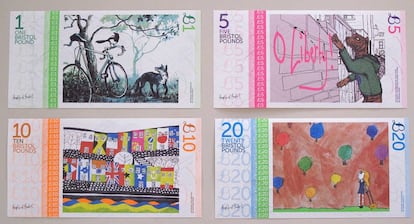Bristol to Barcelona: “Be as ambitious as possible with new local currency”
British city, which counts on popular “Bristol Pound,” has plenty of advice for Catalan capital
As Barcelona develops its plans for a future local currency, which is due to be launched next year, it is keeping a close eye on the example of Bristol, in the United Kingdom. It has been four years since the south-western English city launched the Bristol Pound, a currency that runs parallel to sterling, and seeks to promote the local business sector. Ciaran Mundy, the CEO of the Bristol Pound, has plenty of advice for the Catalan capital: “Be ambitious, and seek to include a great diversity of businesses,” he says.

“It has already made a huge difference in the way our citizens understand money,” Mundy explains. “People from Bristol can see that change is possible and that they can attach a value to their money,” Bristol was not the first city to create a local currency but it has been the most popular so far. In the UK, the town of Lewes, East Sussex, and the Brixton area of London have both run their own experiments, and there are now around 25 cities in the country, including Exeter and Liverpool, that have a similar local method of payment.
The Bristol Pound has a 1:1 equivalence with sterling and does not set out to replace the pound, but rather to coexist alongside it and strengthen ties between the community and local traders. Mundy estimates that since 2012 a total of £B2.5m has been put into circulation, both physical and digital, although he notes that is difficult to put a definitive number on it, as paper currency is hard to measure. In any case, one of the main virtues that the promoters of the initiative highlight is being able to pay local taxes using Bristol Pounds. Doing so ensures that the quantity paid to City Hall will be reinvested nearly automatically into other local businesses instead of big companies or international corporations.
Bristol and Barcelona can experiment with more social ways of creating money
“The Bristol Pound has worked closely with European partner Social Trade Organization to deliver a digital platform,” explains Mundy. The platform is very secure and easy to use and allows payment by text message and online. “We will launch contactless cards in 2017,” says the CEO, who adds that digitalizing the currency ensures the security of the entire system and makes transactions easier than those carried out via conventional banks. The Pound’s webpage offers a list of establishments that accept the payment method.
Lucy Wheeler, who runs a local business called Beast Clothing in Saint Nicholas Market, highlights that what makes the Bristol Pound popular is the way money circulates around the local economy. “After a customer shops with us in Saint Nicholas Market we then spend those Bristol Pounds in another local shop. This supports our local economy and the money stays in the city – it doesn’t end up in The Cayman Islands, other offshore bank accounts or disappearing into other global financial systems,” assures Wheeler, who adds that some customers try to do all their Christmas shopping using the local currency.
Wheeler also says that she has seen a recent increase in the use of the local currency. “A lot of people use it because it makes them feel better,” she says. “Some of them tell us that they try to buy as much as they can in the local stores that accept the Bristol Pound. There are even people who receive part of their salary in local currency,” Wheeler adds. One of them is the former mayor of Bristol, who implemented the Bristol Pound and went even further by taking his entire salary in the currency in order to encourage its use among citizens.
In Barcelona, the new local currency should take into account the city council’s main goals, argues the coordinator from the ESCI-UPF business school, Marta Segura Bonet, who has a PhD in economics. She says that to start with, the local currency will be restricted to some areas of the city, and that it will work as a complementary payment for euros.
From Bristol, Mundy says that the beginning of the project was tough, as it was hard for them to encourage local businesses to join the project. “Few people really know how tough it is to create a currency,” Mundy says. “Bristol and Barcelona can experiment with more social ways of creating money. We can choose how the money will work: change it to benefit people rather than private banks,” he concludes.
elpais.cat in English
From November onward, the Catalan edition of EL PAÍS, Elpais.cat, will include a selection of news stories in English.
The texts will be prepared by journalism students at the Pomepeu Fabra University (UPF), who will be adapting content from Catalan current affairs every week, adding extra information and explanation to these stories so that they can be understood in a global context.
Tu suscripción se está usando en otro dispositivo
¿Quieres añadir otro usuario a tu suscripción?
Si continúas leyendo en este dispositivo, no se podrá leer en el otro.
FlechaTu suscripción se está usando en otro dispositivo y solo puedes acceder a EL PAÍS desde un dispositivo a la vez.
Si quieres compartir tu cuenta, cambia tu suscripción a la modalidad Premium, así podrás añadir otro usuario. Cada uno accederá con su propia cuenta de email, lo que os permitirá personalizar vuestra experiencia en EL PAÍS.
¿Tienes una suscripción de empresa? Accede aquí para contratar más cuentas.
En el caso de no saber quién está usando tu cuenta, te recomendamos cambiar tu contraseña aquí.
Si decides continuar compartiendo tu cuenta, este mensaje se mostrará en tu dispositivo y en el de la otra persona que está usando tu cuenta de forma indefinida, afectando a tu experiencia de lectura. Puedes consultar aquí los términos y condiciones de la suscripción digital.








































